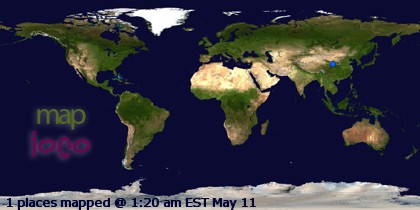A great big long sigh of relief was audible over mid-Maine yesterday evening as we finally got through the last of the chores and the immediate unpacking from our annual pilgrimage to the Shenandoah Valley to see Aimee's family. Thirteen hours in a car, even when spread over two days, is a long time. Maybe one year soon we could afford to fly and rent a car to get around when down there.
But if we could afford that we could also afford to go to the Valleys west of Cardiff to see my folks, Christmas in Wales.
All was well back at the ranch when we arrived home, Spfc. Jennifer, our soldier/farm-sitter having proven herself quite competent, with the assistance, as always, of our helpful neighbors who keep an eye on things too. The heavy snowfall that hindered our journey south a week or so ago is still on the ground, albeit much diminished. Neighbor Hamilton plowed Jen out early last week, and so I have only a little snow to move today, just enough for the sturdy northern work-out I need after Christmas excesses in the bloated south.
The next storm is forecast for Friday, and I'm looking forward to it. I could use a real northeaster, a two-three-four foot rip-roaring 48-72 hour blizzard, with all the trimmings, just to make sure I don't need to go any where for several days!
(Be careful what you wish for. This very sad blog post depicts what happened to some Oregon farmers whose superb blog I read regularly. Not a great Christmas present. But we get two-three foot snowstorms most every year in Maine, and are built for it. Perhaps if I wish for a snowstorm here in Maine where it belongs, it won't fall in Oregon or some other place where it doesn't.)
What next in the Womerlippi seasonal round? Not much, thankfully. I could use some old fashioned winter down time.
There are a few things to do. School starts early this year, in the second week of January. Spring semester is usually a slow start, but I do have to be ready for one new class I've never taught before. Plant start time is still a ways off here in Maine, at least the way we do things, but the greenhouse I built Aimee for Christmas must be finished soon so it will be ready when needed. If I save that job for the sunniest days, it will be a pleasure. Most of what is left to do can be done from the warn inside of the new greenhouse. Seed catalogs will come soon, and Aimee will perform the vital yearly ritual of checking over last year's leftover seeds and ordering this year's new seeds. What she orders in January is pretty much what I eat for vegetables from the following September for a whole year. The first plant starts combine with Six Nations Rugby to make for an interesting February and March. Another ritual. We cheer on England, Wales, and the baby Black Krim Tomatoes.
Then there will be lambs. Lambs are bliss, especially when playing lamb-tag with each other on patches of hay-strewn ground between snowbanks on a bright sunny cold afternoon in late March. This year we should have lots of lambs because we have seven ewes that are likely bred.
Ten is a nice round number.
In the meantime, nothing much will happen around here except for the steady movement of firewood from woodstack to stove to chimney to atmosphere, and the steady movement of hay bales from barn attic to hay crib to sheep belly to sheep poop to compost-pile.
The Carbon Cycle, up close and personal.
One way or another, it's the breaking of hydrogen bonds in the cellulose and sugar of hay, oats, corn, and firewood that keeps the entire farmstead and its residents warm.
We can measure the progress from midwinter to spring and lambs by the steady diminishing of hay and firewood stacks, by the onset of Six Nations, and by the tentative growth of tiny green plants in newspaper pots.
In the Bleak Midwinter
Text: Christina G. Rossetti, 1830-1894
Music: Gustav Holst, 1874-1934
Tune: CRANHAM, Meter: Irr.
1. In the bleak midwinter, frost wind made moan,
earth stood hard as iron, water like a stone;
snow had fallen, snow on snow, snow on snow,
in the bleak midwinter, long ago.
2. Our God, heaven cannot hold him, nor earth sustain;
heaven and earth shall flee away when he comes to reign.
In the bleak midwinter a stable place sufficed
the Lord God Almighty, Jesus Christ.
3. Angels and archangels may have gathered there,
cherubim and seraphim thronged the air;
but his mother only, in her maiden bliss,
worshiped the beloved with a kiss.
4. What can I give him, poor as I am?
If I were a shepherd, I would bring a lamb;
if I were a Wise Man, I would do my part;
yet what I can I give him: give my heart.
Tuesday, December 30, 2008
Saturday, December 27, 2008
Brits discover rural roots via urban hens
Womerlippi farm hens: this year's Buff Orpingtons.
Here's an interesting Grauniad article about how many of my fellow countrymen and women are rediscovering the helpful hen, even in urban settings.
Following on my grandad's heels as a young tyke, I grew up partly in what I thought for many years was a long-gone world of terrace streets and allotments (community gardens), where old men like my grandfather, World War I and II veterans for the most part, practiced a Yorkshire kind of urban self-sufficiency with great efficiency and expertise. Hen coops and rabbit hutches were commonplace in the allotments. During WWII, mother kept rabbits as a young girl, while dad kept bantam hens, until he was bombed out and evacuated to the country.
Now apparently the allotments are making a comeback, and so are the urban hens.
Grandad could grow massive amounts of good food on his patch, not to mention huge quantities of cut flowers, dahlias, chrysanthemums, and the like. Flowers and veggies alike were wrapped in newspaper bundles and carried home, some distributed on the way to various folks he knew.
Growing and giving away food is a family tradition.
Saturday, December 20, 2008
Rental Ram Return

 Taking Snorri the rental ram back to his home farm was Friday's big job. Snorri is a very mellow fellow and we'd like to keep him but you can't easily have two rams on one small farm, so he had to go home after doing his duty by our second generation Womerlippi ewes this fall.
Taking Snorri the rental ram back to his home farm was Friday's big job. Snorri is a very mellow fellow and we'd like to keep him but you can't easily have two rams on one small farm, so he had to go home after doing his duty by our second generation Womerlippi ewes this fall.This is one of his family back home, a very fuzzy ram lamb, the other series is of the unloading, as Snorri jumps out of our pickup and runs back into his own home barn.
Aimee loved the ram lamb and wanted to take him home a little because he was such a cutie, but settled for knowing that some of Snorri's offspring, due as early as eight weeks from now, will look like him.
Hopefully they're as well-behaved and mellow. Snorri was a great improvement in character on our own dude, Abraram, who will butt you anytime you turn your back, and is big enough to do real damage.


Wednesday, December 17, 2008
Womerlippi Farm Promotional Products


 Aimee is going into the promotional product business in a big hurry. She devised the farm logo on a whim one day: a chicken standing, somewhat victorious, upon a placid sheep.
Aimee is going into the promotional product business in a big hurry. She devised the farm logo on a whim one day: a chicken standing, somewhat victorious, upon a placid sheep.And once we had a logo, we needed t-shirts, of course.
This is the t-shirt making process. Quite ingenious of her, I think.
Our kitchen is now festooned with drying t-shirts. A veritable sweat shop. Some of you, the elect, may get one of these for a Christmas stocking stuffer.
A serious fashion statement!

Tuesday, December 16, 2008
Happy Holidays!
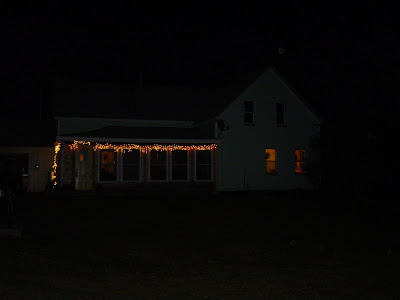
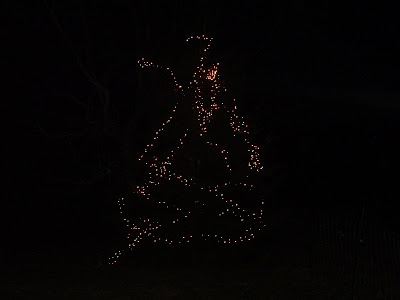
It's getting to look a lot like Christmas at the Womerlippi Farm.
We now have fully lit, fully decorated trees, one in the house, one outside. Aimee has wrapped most of her gifts, and begun addressing cards.
The indoor tree was a balsam fir I found on our leased land. The outdoor tree is the one that lives at the bottom of our lawn.
I like to decorate with lights. My one energy weakness. I guess you could say we save energy all year, so we don't mind a small splurge at holiday time.
Sunday, December 14, 2008
Half Time Break!
(This post mirrored from the Unity College Sustainability Blog)
With some time off coming to me now the semester is over, I have in mind to do some long-postponed sustainability projects.
The first is catching up on my sleep! This last two weeks, with the lowering of our NRG wind assessment tower, a four-day conference trip, repeated Introduction to CLE map-reading finals, numerous other final projects, I've been feeling a little "wore down" as Huck Finn might say.
And that is definitely not sustainable. Teaching is a stressful occupation, and the long breaks are needed to recharge your batteries.
Then I have some farming and homesteading to do. Regular readers will know that I keep a second blog at www.womerlippi.blogspot.com where my partner Aimee (also a UC professor) and I post pictures and stories from our adventures on a 15 acre homestead in the deep greenwood of Jackson, ME. My main project is building a greenhouse for Aimee for a Christmas gift, but we also have seven bred (that would be "pregnant" to you city folk) ewes to care for, and a borrowed ram to return to his own farm 60 miles away.
Lambs will arrive soon enough, so we have to pay close attention to the ewe's welfare at this time of year. They get extra feed, and we make sure their water doesn't freeze and so on. Daily chores get harder to do as the snow and cold creep on. We still have to move snow, pipe or carry water, deliver feed, and move manure and bedding, even when the thermometer reads below zero in a white-out.
But when the spring finally comes, we won't miss it. We'll be right there. We live lives that are very close to nature, and thoroughly enjoy the changing seasons on our small farm.
The next is mastering the wind assessment software world. This is an indoor job. With a year's data from two separate sites, the Mt View High School site and the Kinney Farm site, I have the opportunity to create a good wind resource report for the Knox Ridge area. Problem there is, NRG only makes software that works in IBM-clone computers, and I use a Mac. No worries, the new Macs allow the evil Windows to be loaded on a segregated hard drive. For the first time, I can dink around with NRG's products in the few hours a day when I actually have time, early in the morning in my own den. Finally, I can begin to learn how to use the software. I also will be looking to find a new community wind site for my students to put up the tower and read the wind for another year. The logistics of wind assessment are formidable, and this coming year our new site might be on a Maine island, which will be beautiful, but three times as difficult to plan out.
Not sure how I feel about having Windows on my Mac, though. I'm deliberately not connecting the Microsoft partition of the hard drive to the Internet, except via the Mac partition, so as to avoid viruses. Let's hope it works.
There are lots of smaller things I want to do, like catching up on my reading. Right now I'm reading The American Future by Simon Schama. Schama, a British jew, is an interesting combination of social liberal and political libertarian, with an eye for the intricacies of the "special relationship" that I've lived out loud the 22 years I've been in this country. The book traces the recent Obama victory (how did he get it out so fast?) back through American memory to look at the peculiar mental pathways that define the roots of American freedoms. Shades of David Hackett Fisher. whose Albion's Seed is positively my favorite work of American history.
And then there's family Christmas. Most regular readers will know that Aimee comes from a German-American Church of the Brethren backgound, and her family are located in the western PA and Shenandoah Valley homelands of the Brethren, Amish and Mennonite communities. We'll travel to the Shenandoah, where we'll go to the Christmas Eve service with her immediate family, visit the Amish and Mennonite farmer's markets, loading up on "plain" food, kitchen goods, seeds, and other products not routinely available in Maine, but useful to homesteading, and visit with her extended family in the retirement community at Bridgewater College, the Brethren-run school in the town of the same name. I always enjoy touching back in with the history of the Peace Church societies in the Shenandoah. Unity itself is an old Quaker town, founded by Quakers, who helped choose it's name. The old meeting house belongs to the college now, and I use it for storage. The new meeting house is where Aimee and I were married, the first Quaker wedding in Unity since at least 1927, with a silent meeting in the old Quaker tradition.
And now the Amish are moving to Unity, Thorndike, and surrounding parts. I met their school teacher the other day. He has the same last name as the Amish family I was friends with in western Maryland. I'm glad to see them, because they feel like home. Funny how the Peace Churches always run through my life. Even when I lived in Missoula, MT, I discovered some Amish history, specifically of their involvement in WWII firefighting for the USFS. There some Amish boys even became smokejumpers during the war, as alternative service, and I made friends with one of these characters though my work with the senior center's Friday forest outings, which I ran as part of my work for Wilderness Institute, but which were paid for through a Forest Service grant.
Peace Church history weaves itself like a thread though my life. I'am also looking forward this break to reading Peter Brown and Geoff Garver's new book on economy and environment from a Quaker perspective, which I helped organize. I think it will be an important new book, and I'm excited to see how well it sells. There will also be a number of educational meetings held to discuss the book with Peace Church communities, and I may be involved. Peter gives an interview on the book at this video site here. Plain speech.
Soon enough all this relative freedom of time will come to an end, and we'll be back at college, on the starting blocks for the race to graduation in early May. The academic year, like the fall semester, always comes to an crashing, grinding end with a big last minute rush. It's never pretty. But it does always end, for which I am always grateful, just as I am now for this upcoming month of freedom.
And a new crop of UC graduates will go out into the world, hopefully to make as much of a difference, or more, than previous generations. If you want to know how successful this college is, well, you might not know, until you go to a National Park, or National Forest, or perhaps a small rural school, or an environmental summer camp, and ask around. Pretty soon you'll find one of ours. Or two, or three.
Unity graduates are everywhere and anywhere the environment needs to be protected.
With some time off coming to me now the semester is over, I have in mind to do some long-postponed sustainability projects.
The first is catching up on my sleep! This last two weeks, with the lowering of our NRG wind assessment tower, a four-day conference trip, repeated Introduction to CLE map-reading finals, numerous other final projects, I've been feeling a little "wore down" as Huck Finn might say.
And that is definitely not sustainable. Teaching is a stressful occupation, and the long breaks are needed to recharge your batteries.
Then I have some farming and homesteading to do. Regular readers will know that I keep a second blog at www.womerlippi.blogspot.com where my partner Aimee (also a UC professor) and I post pictures and stories from our adventures on a 15 acre homestead in the deep greenwood of Jackson, ME. My main project is building a greenhouse for Aimee for a Christmas gift, but we also have seven bred (that would be "pregnant" to you city folk) ewes to care for, and a borrowed ram to return to his own farm 60 miles away.
Lambs will arrive soon enough, so we have to pay close attention to the ewe's welfare at this time of year. They get extra feed, and we make sure their water doesn't freeze and so on. Daily chores get harder to do as the snow and cold creep on. We still have to move snow, pipe or carry water, deliver feed, and move manure and bedding, even when the thermometer reads below zero in a white-out.
But when the spring finally comes, we won't miss it. We'll be right there. We live lives that are very close to nature, and thoroughly enjoy the changing seasons on our small farm.
The next is mastering the wind assessment software world. This is an indoor job. With a year's data from two separate sites, the Mt View High School site and the Kinney Farm site, I have the opportunity to create a good wind resource report for the Knox Ridge area. Problem there is, NRG only makes software that works in IBM-clone computers, and I use a Mac. No worries, the new Macs allow the evil Windows to be loaded on a segregated hard drive. For the first time, I can dink around with NRG's products in the few hours a day when I actually have time, early in the morning in my own den. Finally, I can begin to learn how to use the software. I also will be looking to find a new community wind site for my students to put up the tower and read the wind for another year. The logistics of wind assessment are formidable, and this coming year our new site might be on a Maine island, which will be beautiful, but three times as difficult to plan out.
Not sure how I feel about having Windows on my Mac, though. I'm deliberately not connecting the Microsoft partition of the hard drive to the Internet, except via the Mac partition, so as to avoid viruses. Let's hope it works.
There are lots of smaller things I want to do, like catching up on my reading. Right now I'm reading The American Future by Simon Schama. Schama, a British jew, is an interesting combination of social liberal and political libertarian, with an eye for the intricacies of the "special relationship" that I've lived out loud the 22 years I've been in this country. The book traces the recent Obama victory (how did he get it out so fast?) back through American memory to look at the peculiar mental pathways that define the roots of American freedoms. Shades of David Hackett Fisher. whose Albion's Seed is positively my favorite work of American history.
And then there's family Christmas. Most regular readers will know that Aimee comes from a German-American Church of the Brethren backgound, and her family are located in the western PA and Shenandoah Valley homelands of the Brethren, Amish and Mennonite communities. We'll travel to the Shenandoah, where we'll go to the Christmas Eve service with her immediate family, visit the Amish and Mennonite farmer's markets, loading up on "plain" food, kitchen goods, seeds, and other products not routinely available in Maine, but useful to homesteading, and visit with her extended family in the retirement community at Bridgewater College, the Brethren-run school in the town of the same name. I always enjoy touching back in with the history of the Peace Church societies in the Shenandoah. Unity itself is an old Quaker town, founded by Quakers, who helped choose it's name. The old meeting house belongs to the college now, and I use it for storage. The new meeting house is where Aimee and I were married, the first Quaker wedding in Unity since at least 1927, with a silent meeting in the old Quaker tradition.
And now the Amish are moving to Unity, Thorndike, and surrounding parts. I met their school teacher the other day. He has the same last name as the Amish family I was friends with in western Maryland. I'm glad to see them, because they feel like home. Funny how the Peace Churches always run through my life. Even when I lived in Missoula, MT, I discovered some Amish history, specifically of their involvement in WWII firefighting for the USFS. There some Amish boys even became smokejumpers during the war, as alternative service, and I made friends with one of these characters though my work with the senior center's Friday forest outings, which I ran as part of my work for Wilderness Institute, but which were paid for through a Forest Service grant.
Peace Church history weaves itself like a thread though my life. I'am also looking forward this break to reading Peter Brown and Geoff Garver's new book on economy and environment from a Quaker perspective, which I helped organize. I think it will be an important new book, and I'm excited to see how well it sells. There will also be a number of educational meetings held to discuss the book with Peace Church communities, and I may be involved. Peter gives an interview on the book at this video site here. Plain speech.
Soon enough all this relative freedom of time will come to an end, and we'll be back at college, on the starting blocks for the race to graduation in early May. The academic year, like the fall semester, always comes to an crashing, grinding end with a big last minute rush. It's never pretty. But it does always end, for which I am always grateful, just as I am now for this upcoming month of freedom.
And a new crop of UC graduates will go out into the world, hopefully to make as much of a difference, or more, than previous generations. If you want to know how successful this college is, well, you might not know, until you go to a National Park, or National Forest, or perhaps a small rural school, or an environmental summer camp, and ask around. Pretty soon you'll find one of ours. Or two, or three.
Unity graduates are everywhere and anywhere the environment needs to be protected.
Saturday, December 13, 2008
Ice storm update
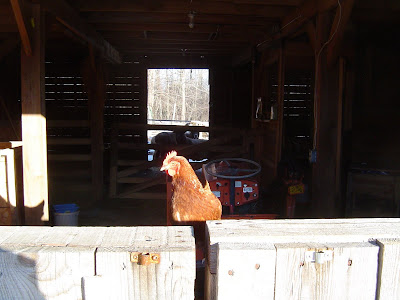 Photo: All the nasty weather meant it was time to move the tractor to the barn where it can be kept snow free and ready for plow work. This chicken found it a handy perch for observing goings-on outside the barn.
Photo: All the nasty weather meant it was time to move the tractor to the barn where it can be kept snow free and ready for plow work. This chicken found it a handy perch for observing goings-on outside the barn.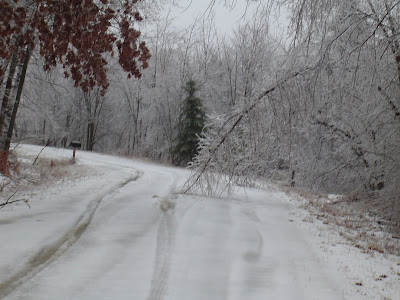
Well, in the end it wasn't our power that we lost, but our telephone and internet connection. Fairpoint, who runs the local phone lines, had it hooked up again pretty quickly, but then it went out again last night sometime, and was again restored this morning.
Even so, when the phone goes out, you either do without, or go find a phone that works to tell the phone company. I had to do the latter Friday, even after I posted saying I wouldn't, since we both had college work to do for which we needed the Internet. I drove to college to tell the phone company, but ended up staying all day. Not at all what I had planned.
This bendy birch tree was on Great Farm Road as I left. Someone took care of it by the time I came back, probably our neighbor to the north, Hamilton. We have excellent neighbors, which we do not take for granted, after experiencing our neighbor at the Bale House who threatened to shoot our dogs. I try to help Hamilton and his family out whenever I can, and he reciprocates.
In Maine, you need your neighbors. The normal atomistic individual view of American life falls down when you have blizzards, ice storms, wind storms, floods and hurricanes, four or five regular weather emergencies every year.
This afternoon's trip to the hardware store provided the neighborly intelligence that lots of other folks around here lost their power, and are still without now, almost 48 hours after the event. Crews are driving our way from neighboring states, but it may take a few days. Our house happened to be on an unaffected spur line. For once.
Some Mainers without wood stoves or some form of back-up heat will get cold houses as a result, and have to go to motels or to the various shelters the state has opened. The weather is good for driving, if cold, so Mainers won't be hurting too much. Generally, we're used to it, and plan for it. At the Womerlippi farm, we use wood stoves for heat and cooking and oil lamps for light, as well as inverters running off the truck, and so we'd be fine, albeit reading books rather than watching TV. But we would never go to a shelter, unless the house burned down. We have animals to look after.
Friday, December 12, 2008
 Anyone who has not experienced a full-blown New England ice storm can do so vicariously via these pictures. Yesterday was our last final examinations, and so Aimee and I don't have to go to work today. Not that we could, since even the 4WD truck would have a hard time on the icy roads, and is in any case encased in half an inch of solid ice.
Anyone who has not experienced a full-blown New England ice storm can do so vicariously via these pictures. Yesterday was our last final examinations, and so Aimee and I don't have to go to work today. Not that we could, since even the 4WD truck would have a hard time on the icy roads, and is in any case encased in half an inch of solid ice.The cure for ice is of course, fire, and so I intend to tend ours carefully all day, and keep the house especially warm to keep the ice melting off roofs and windows.
The clock on the kitchen stove keeps a helpful record of the minutes elapsed since the last outage. By my reckoning, 33 minutes of un-interrupted power is our record so far this morning. Every time a tree falls or leans on a high voltage power line, the breaker between that line and the next highest in the grid hierarchy will pop, and cut off power to one or the other locality. Everyone else in that power district will know what happened because their power will flicker off and on as the breaker pops.
And trees will lean or fall, all across the frozen landscape. Generally, the birches and young popples ("popple" being aspen to you westerners) will bend, being adapted to ice. Other trees will snap. Several tons of frozen water can be added to the live weight of a tree during an ice storm. Or a building, or a fence. Even a poor old rototiller abandoned in a corner of the garden might gather a hundred pounds or two, although it won't likely suffer as much as the apple tree behind might.
Despite the weather, animals must always be fed and watered and checked upon, and so we human farmers must venture out. As I took these pictures this morning, this ice was starting to turn to rain. If a cold front is behind the ice, though, everything will snap back to ice later, and we'll be locked in a for a few days until the ice melts.
Generally, like most genetic northerners, I relish bad weather. Remember, I'm from northern Old England, born ten degrees of latitude further north than here, even. In Yorkshire we get freezing fog, which is another interesting form of atmospheric ice, and the occasional polar air stream, which is a phenomenon of great beauty, although equally as dangerous.
Once, high on the Yorkshire moors, my RAF Mountain Rescue Team were locked into a warm pub until the wee wee hours, singing old songs, oblivious as a polar gale swept in. The next morning, we staggered blearily out of frozen tents into a true arctic blizzard in which we could barely stand up. The duty cook was gamely trying to cook bacon with one hand and hold on to the ridge pole of the NATO 12 by 12 tent with the other, essentially running the risk of becoming a human kite in the process. Not wishing to stay long in such a terribly exposed place, the best we could do was to pack up as quickly as possible, rolling the tents into giant snowballs, several men throwing each ball into the back of a three-ton truck.
We left the pub, which was built of stone and four square to the wind, far behind. But that pub was already four hundred years old at the time. It managed just fine.
Luckily all the vehicles started, after a few jump-starts, and we headed for lower altitudes.
Elsewhere in Britain, on a different moor, a group of boy scouts froze to death in their tents that night.
No-one will freeze on this farm today. As you can see, our barn is warm and bright with the lights on, safe shelter for all the indoor animals, and the extra hay and oats I gave the few outdoor sheep this morning will keep them warm all day. They also have a small shelter.
You can tell which sheep chose to spend the night out. Nellie! Silly girl. She's tucking into a good feed of hay though, so she's none the worse.

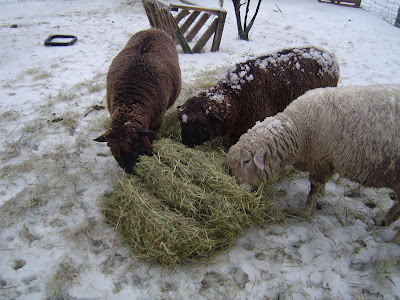

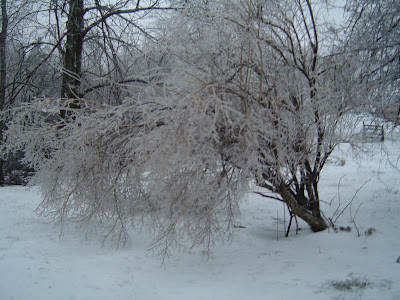

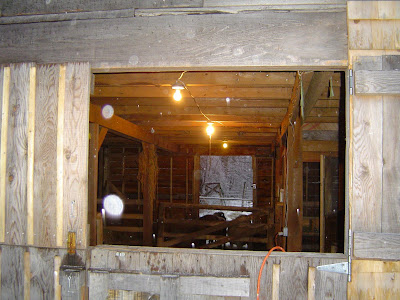


Monday, December 1, 2008
But her favorite muses are our animals. Here's a selection of what I found on her camera yesterday.
The big blond fluffy hens are our Buff Orpington layers, who were babies this spring.
They all get names, although it takes a while for Aimee to figure out which bird gets what name. She generally waits until they distinguish themselves in some recognizable way.
This is "Spike" and "Skippy." Spike has a spiky comb. Skippy likes to skip.
The next shot is Shenzhi-cat trying to catch the water coming out of our basement sump pump.
That cat will catch anything and everything.
Then there's Mo, laying an egg in the hay rack, followed by a shot of the chicks in the new greenhouse, partly constructed so far.
I've decided that this greenhouse is Aimee's Christmas present. Aimee. for her part, bought me something on eBay, but won't say what. I hope it's a Land Rover.
Back to the pictures.
Finally, there's a shot of Buela, who is our most aggressive, cock-like hen. The aggression really comes out in the shot. I think that hen wants to peck the camera.
Buela likes to fight with Aimee. Aimee pretends to fight back, and they have a kind of fake cockfight regularly.
I guess you have to be there to fully enjoy the sight of a tiny hen fighting a short German-American farm-wife. But I recommend it.
Like I said, we entertain ourselves around here. Animals are better than TV.
It may seem lame to some more sophisticated types, but it's a life.
Subscribe to:
Posts (Atom)
